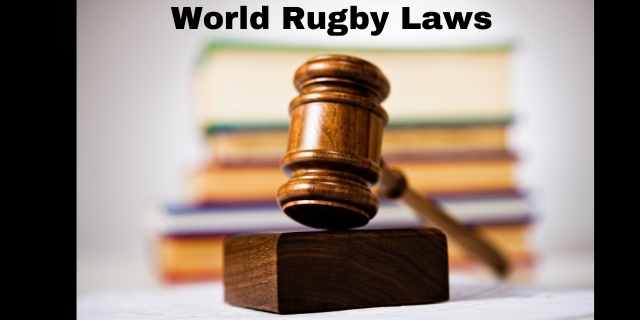Players are allowed to head the ball in rugby if it’s passed or kicked by a teammate or an opponent. This is nearly always an accidental occurrence in a game.
Even if the ball goes forward, this is not deemed to be a knock-on. The player can regather the ball and play continues normally.
It’s natural to wonder if a player could throw the ball up into the air and head it over their opponent’s head. This article goes in-depth into this topic.
What Happens If The Ball Hits A Player’s Head Accidentally?
The most common scenario when I see this happen is when players who aren’t expecting pass are hit in the head with the ball.
Usually, it’s a forward who is running a dummy line to deceive the defense into thinking they will receive the ball. The forward isn’t watching the ball carrier or the scrum-half at the back of a ruck.
In this scenario, the ball hits the unfortunate player on the side of the head. What happens? Well, the opposition supporters roar with delighted laughter!

But the referee takes no action at this point. This isn’t a knock-on or any other type of infringement.
Play can continue as long as a teammate in front of the header doesn’t catch or pick up the ball. Why so? Because that would be offside. Read on to learn why.
Who Is Offside When A Ball Comes Off A Player’s Head?
When the ball hits off a player’s head and goes forward, any teammate who is ahead of the player is offside.
The offside players cannot catch, pick up, or kick the ball. If they do, the referee will award a penalty to the opposition.
Players who are offside have to retreat first to an onside position before moving forward toward the ball.
Who are onside?
Teammates behind the player who heads the ball are considered to be onside. They can gather the ball or hack it forward.
What about the player who headed the ball? Yes, they are allowed to catch the ball or play it in some way.
“Off The Head”
In a fast-moving sport like rugby, it’s not always obvious whether the ball has hit the player’s head and gone forward or if it’s come off their hands.
If the ball goes forward off the player’s hands, then this is a knock-on. The referee will blow the whistle and award a scrum to the opposition.
However, the ball coming off the player’s head is not a knock-on.
Referees usually let players know immediately by shouting “off the head”.
This means that the players know that the referee is not playing an advantage, and there has been no infringement.

What Happens If A Rugby Player Heads The Ball Deliberately?
This situation is so rare that I’ve never been at a match where it happened. But I’ve scoured the internet to find a few examples!
Heading a ball that the player kicked
Our first example is a club match in New Zealand (link is a video).
The ball carrier swerves past a few defenders and then kicks the ball forward to chase it. You can never predict the bounce of a rugby ball!
The ball bounces up and backward, falling toward the head of the onrushing attacker.
What happens next isn’t initially clear to the commentators. The ball bounces forward again, hits the ground, and bounces kindly into the attacker’s hands who grounds it over the line for a try.
“Ball off the shoulder, I think” shouts the commentator.
But the replay shows the ingenuity of the player. The replay shows that he heads the ball forward and continues running. The try is awarded.
Bonus example
This example doesn’t really illustrate the point because the header of the ball isn’t a player!
The match is a European tussle between Munster and Racing 92 (link is a video). The outhalf kicks the ball full into the face of the referee who goes down like a sack of spuds.
Wayne Barnes handles the situation in good humor.
Can A Rugby Player Throw the Ball Into The Air And Head It Forward?
We have a separate article that addresses whether rugby players can throw the ball forward and catch their own pass.
But what if the ball carrier is running towards the opposition, tosses the ball upwards, heads it over them, and catches it on the other side?
After all, they’re entitled to kick a delicate chip over the opponents’ heads and catch that! (Check out our article on rugby players catching their own kicks).
There is no explicit law against heading the ball

There’s no point scouring the rule books to find a section that forbids a deliberate header like this. The scenario is simply not mentioned.
There are several lengthy discussions on a popular rugby referee forum with back-and-forth debate over this topic. Some referees say it’s perfectly legal. But most don’t like it!
Against the spirit of the game
Most referees, players, and supporters would consider this kind of move to be against the spirit of how the game should be played.
In the immortal words of the most famous referee in the sport: “this is not soccer!”
Nigel Owens was ticking off a player for shouting at him, not heading the ball. But you get the point.
So, why haven’t the authorities added a clause to the law books to stop it? Because it simply isn’t happening on the pitch. Why ban what isn’t a problem?
I’m sure if players started trying this technique, it would be swiftly made illegal. There is no way that the authorities want a sudden increase in anything hitting players’ heads. There is a massive emphasis in the sport on reducing head impacts.
Rugby League Banned Players From Heading The Ball
This article is about Rugby Union but the situation can also happen in Rugby League.
Here’s an example of a very deliberate heading of the ball. I think the match is Saints against Wigan (link is to some grainy old footage).
To restart play, one of the big forwards tosses the ball up into the air and heads it over the defensive line. His teammates run past him and touch the ball down for a try.
The League authorities weren’t impressed by this piece of attacking ingenuity. They actually banned this explicitly in the League rules.
Other Rugby Questions You Always Wanted To Ask
The rules in rugby aren’t always obvious. Most casual fans understand that players aren’t allowed pass the ball forwards. But you may have some other burning questions. Check out these articles: